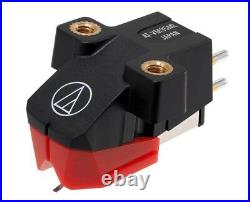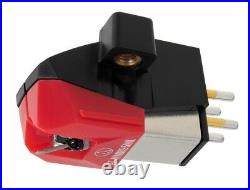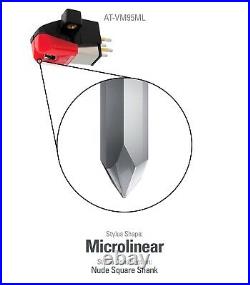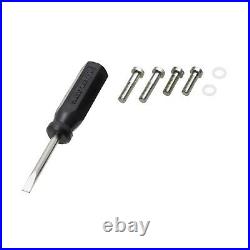Audio Technica AT-VM95ML MM Cartridge with Microline Stylus Read The Review







Moving Magnet Cartridge with Microline Stylus. We are very pleased to be able to offer the fantastic VM95. Of cartridges from Audio Technica. And equally pleased to give them a thorough recommendation having played them and heard them reproduce a variety of music types. You can read the review of the range at the foot of this description. This model comes with the Microline stylus. This VM95 Series cartridge with 2.2 x 0.12 mil Microlinear stylus fits half-inch mount turntables. The cartridge offers excellent channel separation and low distortion for outstanding tonal quality. The durable, low-resonance housing includes threaded inserts that enable the cartridge to be mounted to the headshell with just two screws no nuts required. And since all VM95 Series share the same body, the stylus can be replaced with any of the six interchangeable AT-VMN95 replacement styli. Package includes: Cartridge, stylus, mounting screws, non-magnetic screwdriver. Frequency Response 20-25,000 Hz. Channel Separation Frequency Response 20-25,000 Hz. Channel Separation 23 (dB at 1 kHz). Vertical Tracking Force 1.8-2.2 g (2.0 g standard). Stylus Construction Nude square shank. Recommended Load Impedance 47,000 ohms. Output 3.5 mV 1 kHz, 5 cm/sec. Channel Balance 1.5 dB (1 kHz). Stylus Shape 2.2 x 0.12 mil Microlinear. Coil Impedance: 3.3 k ohms (1 kHz). DC Resistance: 485 ohms. Load Capacitance: 100 to 200 pF. Coil Inductance: 550 mH (1 kHz). Vertical Tracking Angle: 23°. Dimensions: 17.2 mm (0.68″) H × 18.9 mm (0.74″) W × 28.3 mm (1.20) D. Weight: 6.1 g (0.22 oz). Accessories Included: Two 11 mm installation screws, two 8 mm installation screws, two washers, nonmagnetic screwdriver. Listening impressions for the new AT VM95 cartridge range. We are pleased to present the results of what we believe to be the first thorough listening test and review of the VM95 range outside of ATs own facilities. On a warmish evening in mid October our own Gary Hargreaves of Improved Performance Turntables Ltd, Colin Yallop of Chevron Audio and Mark Wheeler (Reviewer for TNT Audio) sat down and played some music using the VM95 Range. Firstly, lets recognise that very few Audio products have ever achieved the universal level of admiration that the original AT95E moving magnet phono cartridge has in its remarkable 39 year tenure. The unflashy black, chrome and green marvel has been the go-to moving magnet cartridge recommendation for as long as most of us can remember. In that case any change to this stalwart and venerable device must be heralded with narrow-eyed incredulity if not outright suspicion, because, if it aint broke, then why on earth would Audio Technica try and fix it? Well, apart from some enlightened high end specialists like the Japanese Jico corps Hyper elliptical specification, and our own home grown (The Audio Files & IPT Ltd) Paratrace equipped version, there has never really been an upgrade available for the Stylus profile for this popular device, it has been configured with a single purpose, to enable good quality disc replay at a reasonable entry level price for millions of everyday vinyl enthusiasts the world over. The new VM version of this classic Moving magnet design seeks to cater for a broader Hi-Fi church by using one uncomplicated body platform to support a smorgasbord of High performance styli aimed from 78 rpm junkies to complex Extended Contact jockeys alike, so a truly aspirational range of upgraded profiles are laid out to democratize the previously unobtainable heights of Audio Nirvana in a one size fits all solution. Surely theyll never do it? But by golly, after an extended late night listening session in a secret Derbyshire test laboratory, with men of a certain age stroking audiophile beards and using highly contrived and specialist language to illustrate sonic intangibles, like some kind of mutated Vinyl version of those impenetrable Wine Bores, we strove to explain and justify the impossible, how does one stylus profile sound any different to any other? Youll be glad to know that these six VM95 styli sound as different as chalk and cheese from one end of the range to the other. We used the same cartridge body and swapped the stylus each time for our listening tests. All the styli had been nicely run in with 30+ hours of play beforehand. Unboxing the cartridge reveals an item which exudes quality in its design and construction. The body may well be low resonance polymer (black plastic to you and me) but the precision and form of the moulding, matt surface finish and details like the finely screen printed AT logo place it in a different league to the previous model visually. Even the stylus guard which slips on and off with ease seems a step up from the previous well-loved model. The moulded-in brass threaded inserts have finally addressed a bugbear when mounting the former model (Note that AT use the slightly unusual M2.6 thread size and provide screws in two lengths to fit). If we start with the entry level Conical VM95C, then the even handedness and drive of the original 95E has all but been retained, whilst the compromise, unsurprisingly, has been a lowering of detail and texture in the upper harmonics of instrument timbre, and of capturing recorded ambience, but the simplified view has not been at the cost of everything that the cartridge illustrates. The inherent correctness of its tonality remains expressed, so a downgrade well judged was the consensus. More important, it is robust and unfussy about setup as befits an inexpensive entry level cartridge/stylus combination. The VM95E, which takes its place as the new AT95E, has such large shoes to fill and certainly does not disappoint. Everything that was so right, and to be admired in the classic original, was present possibly in slightly sharper etched detail than ever in this reworked evocation of this seminal device. The moulded in brass captive nuts made the swap out and mounting easier and more secure than ever, and the familiar downwards and slightly back pull required to extract and swap out the different stylus assemblies quickly became second nature. The couth and unflappable nature of its presentation is instantly recognizable from the blueprint set out by the 39 year old progenitor. Were here to report that the (green) King might be dead, but long live the new (green) King. The next step up is the Nude mounted VMN95EN. In theory this rocks the same elliptical profile that presents itself to the groove wall as the E, but does so mounted on naught but a small extension of the same diamond shank upon which is ground the profile, this should have the benefit of lower tip mass and the expected gains in tracking that the more favourable physics and mechanics would suggest. This indeed is reflected in a tangible improvement in upper mid band tracking security, with the ability to handle without strain or distortion the higher level and more complex information imprinted when things are getting busy in a mix, or music calls for crescendo or peaks. The consensus seemed to be that some of the added sparkle led to a slight feeling of a tonality skewed towards the rather more brightly lit top end, rather than a less particularly full bass, but the effect may have been a subjective one caused by the increased ability to display more accurately defined treble information of greater scale and complexity. Next up the VM95ML, where ML stands for Microline, again this is a nude mounted single piece of diamond and carries the benefit of the more favourable physics to its obvious conclusion, but this time the more complex grind on the stylus allows a longer and narrower footprint if you will on the groove wall. This should mean that the stylus is better able again to track high frequency information, but crucially, the distortions in phase and skewed timing of HF and transient information is mitigated with this extended line contact design. This is the stylus that first alluded to high end, and rather took us all by surprise. If you can remember the popular Audio Technica 440ML, then here you have an entry level body that pimps up to much the same levels of nuance and detail. This will be enough said for many to make this as their entry point for the new VM95, and who would argue with that? Finally, we get to the enigma that is the Shibata Extended contact profile, at this point, you might feel that the cartridge body (or generator unit) itself is getting beyond its remit, but far from it, the assembled sages found that each step in Stylus sophistication was easily and faithfully revealed by the generator unit in every case. The Shibata tip was first developed in conjunction with Japanese Victor Company (JVC) as a way of tracking specially encoded signals in CD4 Discs which had extra information superimposed upon the original audio and which was then demodulated and decoded to create a four channel sound system (two extra surround channels to provide a more immersive experience) and the engineering heights that needed to be climbed to reliably retrieve this additional information were technical and tough indeed. The resulting Stylus had, by necessity, to track high frequencies (way beyond audibility) in order to retrieve the encoded extra information, many listeners found that its extended abilities made a superior and enhanced stereo listening experience too. The result is amply displayed in the final version of the VM95SH on review here. The VM95 cartridge is being dragged so far from its humble roots as to be scarcely believable. Towards the tail end of the listening session, an extremely proficient Valve phono stage, of very high repute was pressed into service, this again revealed hitherto undreamed of levels of recorded subtlety that we hadnt even realised wed been missing, and everybody had to re-evaluate their expectations once more. The Shibata is up there with some of the best of the worlds stylus profiles, many so called exotic cartridges and moving coil designs too, have tips of considerably lower sophistication than this. Audio Technicas making of this very specialist stylus profile available (as a purely democratic moment) in an entry level cartridge must then be both acknowledged and applauded. This is a truly ground breaking and remarkable Hi-Fi moment, and it seems that the King is, well into the 21st century, in fact alive and kicking, harder and further than ever before. Turntable : Linn LP12, SME309. Phono Stage: Goldnote PH10, Canor TP306 VR+. Preamp: Audio Research Ref 3. Amplifier : Nalty/Wheeler Transistor Amp. Speakers: Kerr Acoustics K320. The item “Audio Technica AT-VM95ML MM Cartridge with Microline Stylus Read The Review” is in sale since Sunday, October 28, 2018. This item is in the category “Sound & Vision\Home Audio & HiFi Separates\Record Players/Turntables”. The seller is “the_audio_files” and is located in Berkshire UK. This item can be shipped worldwide.
- Brand: Audio Technica
- Model: VM95ML
- MPN: VM95ML
- Speed Settings: 33.3RPM
- Colour: Red
- Manufacturer Warranty: 2 years
- Country/Region of Manufacture: Japan
